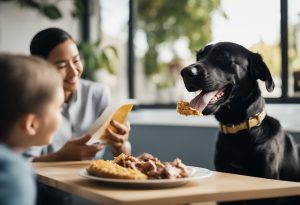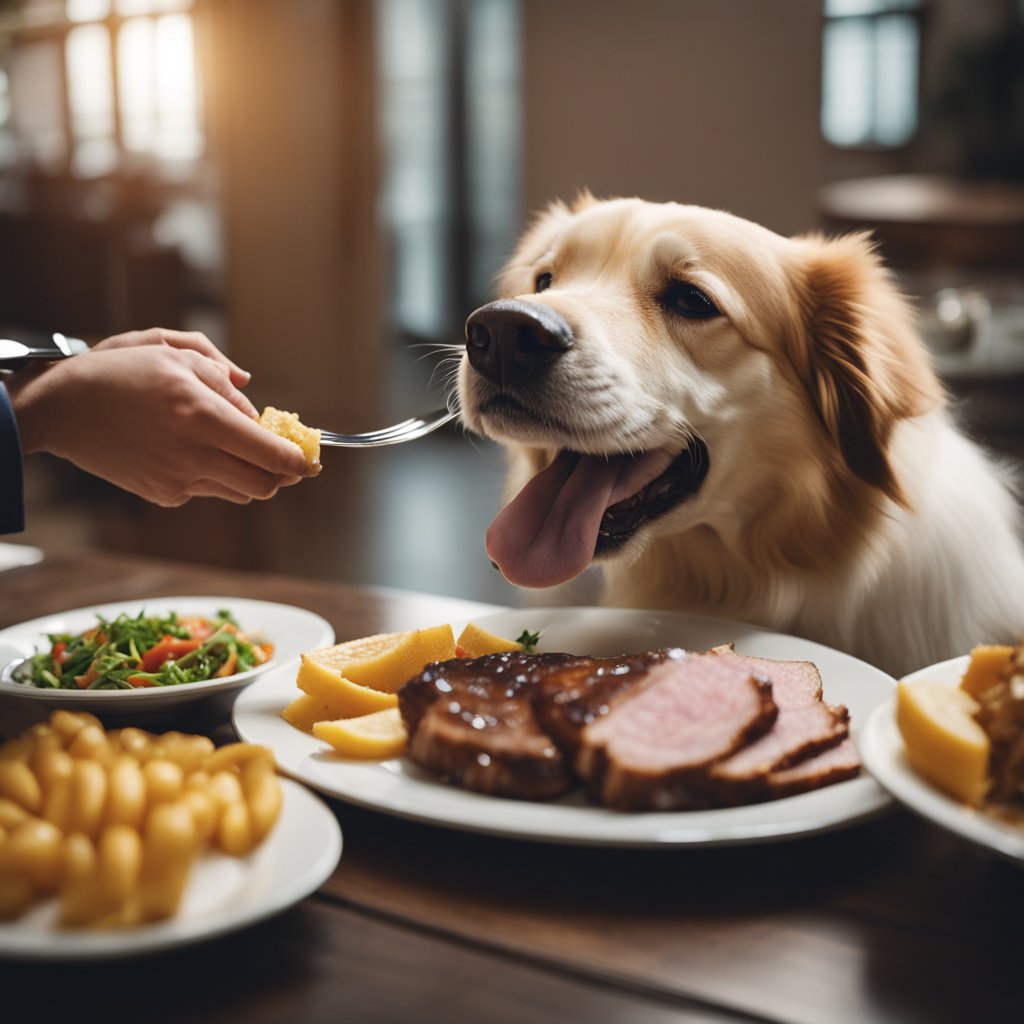Can Dogs Eat Pork? Understanding the Risks and Benefits
Pork is a popular meat among many dog owners, but you may wonder if it is safe for your furry friend. The answer is yes, dogs can eat plain, cooked pork in moderation. It can provide a good source of protein, but it’s essential to be mindful of what parts of the pork you serve and how you prepare it.

While pork can have health benefits when fed to dogs, it also poses risks. Raw or processed pork and certain cuts can lead to health issues. Understanding how to prepare pork safely will help you make informed decisions for your pet’s diet.
Key Takeaways
- Pork can be a safe treat for dogs when cooked properly.
- Avoid raw or processed pork to prevent health risks.
- Always serve pork in moderation as part of a balanced diet.
Health Benefits and Risks of Pork in Canine Diets

Pork can provide some nutritional advantages for dogs but also comes with certain risks. It is important to understand both the benefits and potential health concerns when considering pork for your dog’s diet.
Nutritional Value of Pork for Dogs
Pork is a good source of protein, which is essential for your dog’s muscle development and overall health. Cooked pork contains important nutrients such as B vitamins, especially B12, which aids in energy production and supports brain function.
Additionally, pork is rich in minerals like zinc and iron, which are vital for a strong immune system and healthy blood circulation. However, always serve pork plain and avoid adding seasoning, as many spices can be harmful to dogs.
Potential Health Risks
While pork has nutritional benefits, it also presents risks. Fatty cuts can lead to pancreatitis in dogs, a potentially serious condition. Symptoms include vomiting, abdominal pain, and lethargy.
Processed pork products, like bacon or sausages, often contain added salt and preservatives, which can be bad for your dog’s health. Also, raw pork poses a risk for certain parasites and bacteria, particularly if not cooked properly. Make sure to cook pork thoroughly before serving it to your dog.
Appropriate Portions
When adding pork to your dog’s diet, moderation is key. A general guideline is to offer pork as an occasional treat rather than a regular meal. Limit portions to a small size based on your dog’s weight and dietary needs.
For example, a small dog might receive a few bite-sized pieces, while a larger dog could have a more substantial portion, depending on their dietary requirements. Always monitor your dog’s reaction after introducing pork to their diet, and consult with your veterinarian if you have concerns about portion sizes.
Safe Preparation and Serving Tips

When preparing pork for your dog, it’s important to follow specific guidelines. This ensures that the meat is safe and healthy for your pet. Pay attention to cooking methods, avoid certain products, and be cautious about serving bones.
Cooking Pork for Dogs
To safely feed your dog pork, always cook it thoroughly. The meat should reach an internal temperature of 145°F (63°C) to kill harmful bacteria and parasites. Use a meat thermometer for accuracy.
Cook the pork without any seasonings, spices, or oils. Garlic, onion, and certain seasonings can be harmful to dogs. You can boil, bake, or grill the pork, but always serve it plain. Cut the meat into small portions to make it easy for your dog to chew and digest.
Bones and Choking Hazards
Avoid giving your dog cooked pork bones. When cooked, bones can splinter and pose choking hazards or cause serious internal injuries. Instead, offer raw bones that are specifically designed for dogs and are large enough that they cannot swallow whole.
Always supervise your dog while they are chewing on bones to ensure safety. If your dog shows signs of distress, such as gagging or excessive salivation, remove the bone immediately. Prioritize your dog’s safety when selecting any treats.
Pork Products to Avoid
Certain pork products are not safe for dogs. Processed meats like bacon, ham, and sausage often contain high salt levels and unhealthy fats. These can lead to digestive issues and obesity.
Avoid giving your dog raw pork, as it may harbor trichinella parasites, which can infect both dogs and humans. Always choose fresh, lean cuts of pork and ensure they’re cooked before serving. Maintaining a healthy diet for your dog is key to their well-being.
Resources

If you’re considering adding pork to your dog’s diet, here are some helpful resources.
- American Kennel Club: For information on whether dogs can eat pork safely, visit Can Dogs Eat Pork?. This source emphasizes the importance of cooking pork plainly.
- Dog Food Advisor: This site details why cooked pork can be a nutritious option for dogs. Read more at Can Dogs Eat Pork?.
- Rover: Find expert opinions on how often you should feed pork to your dog in this article, Can Dogs Eat Pork?. It discusses the fat content and safety.
- Dogster: Learn about the risks of high-fat foods and safe pork options at Can Dogs Eat Pork?. This site provides valuable insights on dog nutrition.
- Petco: Before introducing pork to your pet’s diet, check this article for guidelines at Can Dogs Eat Pork?.
These resources will help you make informed decisions about feeding pork to your dog.
Frequently Asked Questions

Understanding how pork affects your dog’s health is important. Here are some specific concerns and facts about feeding pork, including different cuts and raw versus cooked pork.
What are the effects of feeding pork chops to dogs?
Feeding your dog plain, cooked pork chops can be safe as long as they contain no seasoning. Seasonings can be harmful to dogs. Dogs may enjoy the taste, but monitor for any signs of digestive upset after eating.
Is it safe for dogs to chew on pork bones?
Pork bones can splinter easily and pose a choking hazard or serious injury to your dog’s digestive tract. It is safer to avoid giving your dog pork bones altogether, whether they are raw or cooked.
Can feeding pork tenderloin to dogs cause health issues?
Pork tenderloin is generally safe for dogs if cooked plainly. Be cautious with portion sizes, as too much fat can lead to digestive issues or pancreatitis. Always introduce new foods gradually.
What should you do if your dog consumes cooked pork?
If your dog eats cooked pork without any seasoning, it is usually not a cause for concern. Watch for any unusual behavior or digestive problems. If symptoms arise, consult your veterinarian.
Are there health risks associated with dogs eating raw pork?
Feeding raw pork carries some risks, mainly due to harmful bacteria like Salmonella and E. coli. If you choose to feed raw pork, ensure it comes from a reputable source and consider discussing it with your vet beforehand.
How does pork fat affect a dog’s diet?
Pork fat can be high in calories and lead to weight gain if fed in excess. Additionally, high-fat content can trigger pancreatitis in some dogs. Be cautious and limit fatty foods in your dog’s diet.

